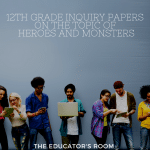Who wants to rewrite curriculum this summer?
(Anyone? Anyone?…..)
Let’s be honest. Writing or rewriting curriculum is a ongoing process that, while necessary, is not always seen as the most positive experience. Moreover, the suggestion of spending summer days writing curriculum (paid or unpaid) may trigger range of emotions, some strangely akin to the model offered by Swiss psychiatrist Elisabeth Kübler-Ross in her 1969 book, On Death and Dying.
That model is commonly referred to as the “five stages of grief”, and those five stages have been applied to many different sciences, from the financial markets (The Five Stage of Bit-Coin Understanding in Fortune Magazine) to sports (The Five Stages of NFL Fan Grief in The Atlantic).The premise of the film Groundhog Day is that the protagonist Phil, is forced to repeat each day as he fails at each stage. Perhaps it is that kind of failure that makes educators confront curriculum revision exhibiting a range of different emotions.
Because the Kübler-Ross model was developed to address the lack of curriculum in hospitals, the model contains language that is especially applicable to any form of curriculum in general. The descriptions in each of the five stages chronicle the emotional rollercoaster that educators at any grade level or in any content area may experience in addressing revisions to curriculum.
[fusion_builder_container hundred_percent=”yes” overflow=”visible”][fusion_builder_row][fusion_builder_column type=”1_1″ background_position=”left top” background_color=”” border_size=”” border_color=”” border_style=”solid” spacing=”yes” background_image=”” background_repeat=”no-repeat” padding=”” margin_top=”0px” margin_bottom=”0px” class=”” id=”” animation_type=”” animation_speed=”0.3″ animation_direction=”left” hide_on_mobile=”no” center_content=”no” min_height=”none”]
1. Denial and Isolation
The first reaction to writing curriculum may be to deny the necessity of the rewrite entirely. According to Kubler Ross, this first reaction, “is a normal reaction to rationalize overwhelming emotions.” Since the overwhelming emotion from teachers at the end of the year (June) is most likely exhaustion, the idea of starting over may not generate a great deal of enthusiasm with the following protests:
“Didn’t we just do this last year?”
“I just finished the whole thing! Why does it need revising?”
“It was the snow day cancellations…I hear there is no polar vortex predicted for next year.”
“Face it…no matter what we write, we are never going to be able to get to World War II.”
2. Anger
As some approach writing curriculum in denial, others may express anger that may be aimed at inanimate objects. In the Kubler-Ross model, frustrations are directed at the PARCC or CCSS or any other state testing. The challenge to revise curriculum means confronting the incendiary topic of testing:
“There are not enough school hours to complete everything in that binder [/fusion_builder_column][fusion_builder_column type=”1_1″ background_position=”left top” background_color=”” border_size=”” border_color=”” border_style=”solid” spacing=”yes” background_image=”” background_repeat=”no-repeat” padding=”” margin_top=”0px” margin_bottom=”0px” class=”” id=”” animation_type=”” animation_speed=”0.3″ animation_direction=”left” hide_on_mobile=”no” center_content=”no” min_height=”none”][of curriculum]to prepare students for that test.”
“Take away the tests, and I’ll deliver the curriculum.”
“It’s those tests that need to change!”
3. Bargaining
The normal reaction to feelings of helplessness and vulnerability can be seen as need to regain control, and in education the Kubler-Ross stage might be captured with statements like these:
“Forget the revision…..I promise I will be more organized next year. I plan on buying post-it notes.”
“Release me from lunch duty, and I’ll have time to deliver the curriculum as is!”
“All we need to do is practice fidelity to all of the the program(s) we have already…I mean all of them….simultaneously….”
4. Depression
In the Kubler-Ross model, sadness and regret predominate this stage of depression. Educators may recognize that they have spent less time on things that matter, and in a series of admissions, agree that something about the events of the past year went terribly wrong:
“I never get to the poetry unit.”
“Someday, I might actually teach about World War II.”
“I confess…Ithrew out the pile of ungraded papers that were in the bottom of my desk drawer since April.”
5. Acceptance
This final stage is marked by those who will finally approach the task of curriculum revision with a sense of calm and commitment. Kubler-Ross is careful to point out that this (hopefully final) stage is not a stage of happiness, but rather a stage of acceptance that can demonstrate a dignity and grace to provide a curriculum that will be carefully revised for the rest of us.
Thank you in advance to all those educators who will remain calm and accept the need to revise curriculum to meet the ever changing demands in education today. They need to get started right away because, good grief…
September is only a few months away!
[/fusion_builder_column][/fusion_builder_row][/fusion_builder_container]





